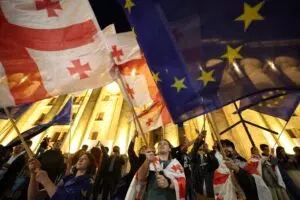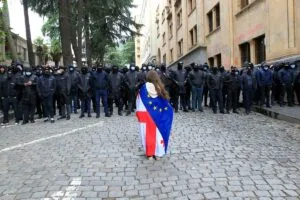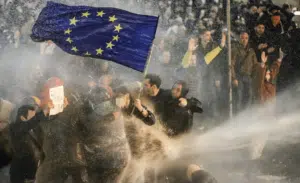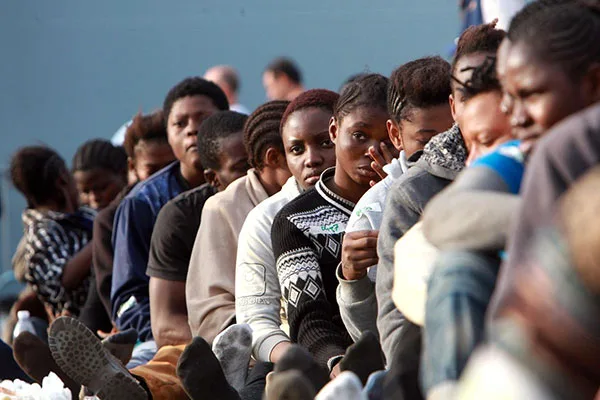Brussels – It had been in the air for weeks, but the collective body that sets priorities and policy directions for the European Union is now putting a full stop to Georgia’s ambitions to be “prepared more than any other candidate country for membership by 2030” (as claimed in February by the premier, Irakli Kobakhidze). “The European Council calls on the Georgian authorities to clarify their intentions by reversing the current course that jeopardizes Georgia’s path to the EU, de facto bringing the accession process to a halt,” read the conclusions of the summit of heads of state and government of the 27 EU member states, which reserve four points to the “serious concern about recent political developments” in the EU candidate country.

It is, specifically, the mid-May adoption of the law on “transparency of foreign influence” of pro-Russian memory that represents “a step backwards from what was set out in the commission’s recommendation for candidate status,” which at this point severely slows down on the road to moving closer to joining the Union, despite the candidate country status received on December 14, 2023, from the European Council itself. Not least because there is also to consider the “increasing acts of intimidation, threats and physical assaults against civil society representatives, political leaders, civil activists, and journalists in Georgia,” warn the Twenty-Seven, who on this point did not encounter the same difficulties in establishing a common position as were seen at the condemnation response to the adoption of the law last May 14. For the Union, there is a clear difference between the government and the overwhelming majority of pro-EU citizens, which is why the 27 leaders reiterated their “willingness to continue to support Georgians on their path to a European future.”
This is where the new chapter opens in the political challenge in Tbilisi between the ruling Georgian Dream party and the citizens who have taken to the streets nonstop for weeks in opposition to the law considered a direct emanation of the Kremlin. “The European Council calls on the Georgian authorities to ensure that next fall’s parliamentary elections are free and fair,” encouraging “substantial long-term and short-term election observation by partners.” The reference is to the upcoming legislative elections on October 26, on which a common platform of parties opposed to Georgian Dreams is being organized around the “Georgian charter” presented in late May by the president, Salomé Zourabichvili. Several political formations have already confirmed that they are running under the same political umbrella (with common or different, but still allied candidates) with the stated goal of “restoring the EU accession process and opening accession negotiations as soon as possible.” Since they are now—as defined by the European Council—”de facto” frozen.
The Foreign Agents Law in Georgia

After the first law approval (according to the ordinary legislative process) last May 14, a new, very rapid legislative process began again a new legislative process to overcome the decision of the head of state, which has always strongly opposed a law that disturbingly repeats many elements of the same law in force in Russia. President Zourabichvili’s gesture was purely symbolic from the moment the government knew at the outset that it could use its overwhelming majority in Parliament to override the veto and make “foreign influence transparency” become law, as confirmed on May 28 from the plenary session of Parliament.
Before the Foreign Agents Act
Despite being granted candidate status for EU membership, the relationship between Brussels and Tbilisi remains particularly complex and now very tense because of the disconnect between an overwhelmingly pro-EU population and a government of pro-Russian tendencies, the same one that applied to join the Union over fears raised by Kremlin expansionism. Over the past two years, there have been several episodes that have highlighted the ambiguity of the ruling Georgian Dream party: in May 2023, flights between Georgia and Russia resumed after Moscow’s decision to lift the current ban, and the Caucasian country never aligned with the restrictive measures introduced by Brussels against the Kremlin after its invasion of Ukraine. Last fall, the government also attempted to put under impeachment (failed) President of the Republic Zourabichvili for a series of trips to the European Union that allegedly constituted a violation of the powers of the head of state under the national Constitution.

But the Georgian population has for years shown that it does not share the direction taken by Georgian Dream, and this is one reason why the elections for parliamentary renewal on October 26 will be crucial. Straddling Brussels’ decision in June 2022 not to grant Georgia candidate status for the time being, two major pro-EU demonstrations took place in Tbilisi: one “March for Europe” to reiterate the people’s alignment with the values of the Union and a public call for government resignation (with no follow-up by the then Garibashvili-led executive). The common features in these demonstrations are the flags—white and red of the five crosses (national) and with the twelve stars on a blue field (of the EU)—, placards with pro-European claims and the Georgian anthem mixed with the Ode to Joy. A year later, harsh popular protests broke out in March 2023—supported by Brussels— which led to the momentary shelving of the controversial bill on “transparency of foreign influence” until it was passed this spring in the midst of a new wave of popular protests.
In this scenario, one should not forget Georgia’s particularly sensitive relationship with Russia, a country with which it borders to the north. Its candidacy for EU and NATO membership—enshrined in its national constitution— has long been a cause of tension with the Kremlin. After conflicts in the 1990s with the two separatist regions of South Ossetia (1991-1992) and Abkhazia (1991-1993) following Georgia’s 1991 independence from the Soviet Union, on the ground, the situation was effectively frozen for 15 years, with troops of the newly formed Russian Federation defending the secessionists within the claimed territory. The attempt to reassert Tbilisi’s control over the two regions in the summer of 2008—wanted by then-President Mikheil Saakashvili—led to a violent Russian reaction on August 7, not only in repelling the Georgian army’s offensive but also leading to the invasion of the rest of the national territory with tanks and air raids for five days. Since then, Vladimir Putin‘s Russia has recognised the independence of Abkhazia and South Ossetia and has deployed thousands of soldiers to the two territories to increase its sphere of influence in the Ciscaucasia region, in violation of the August 12, 2008 agreements.
English version by the Translation Service of Withub









